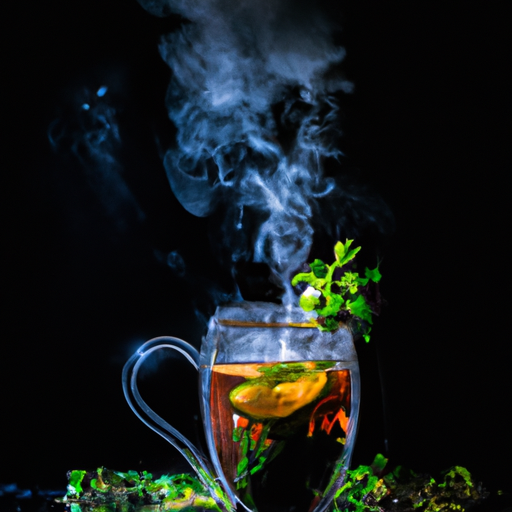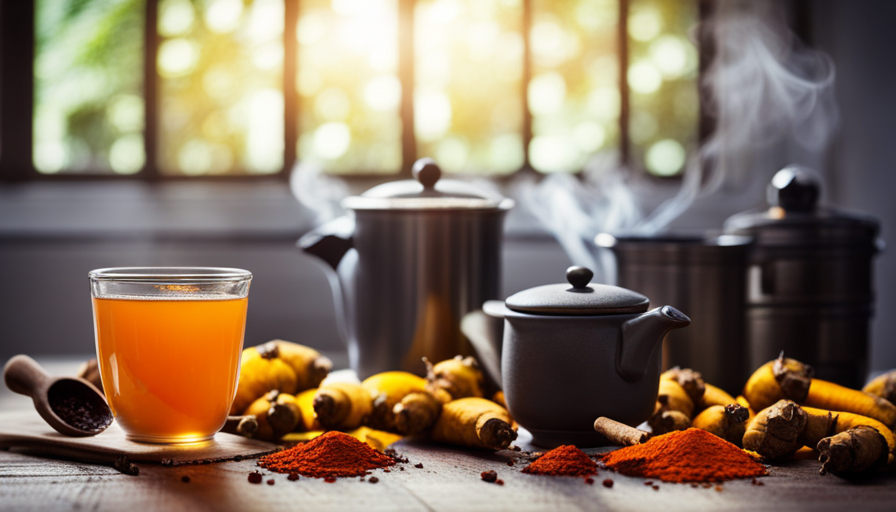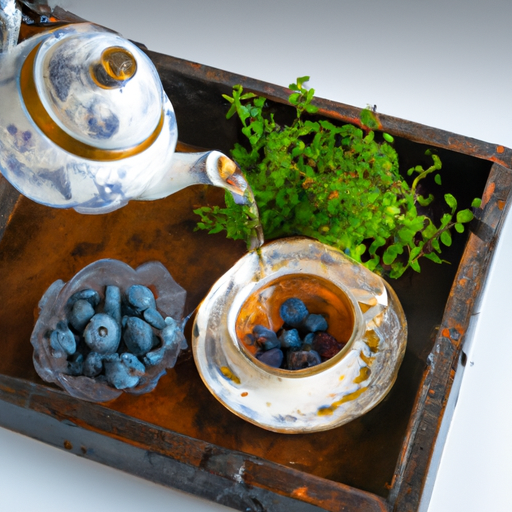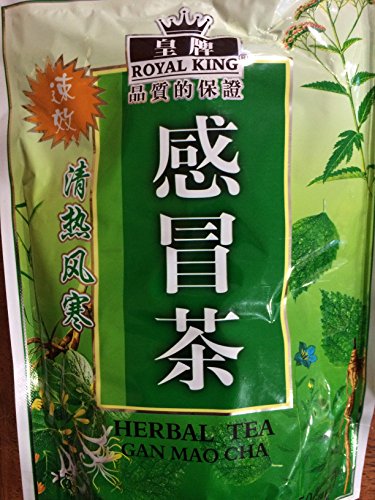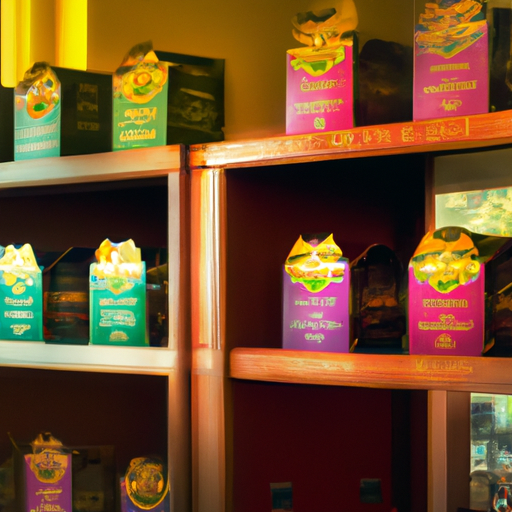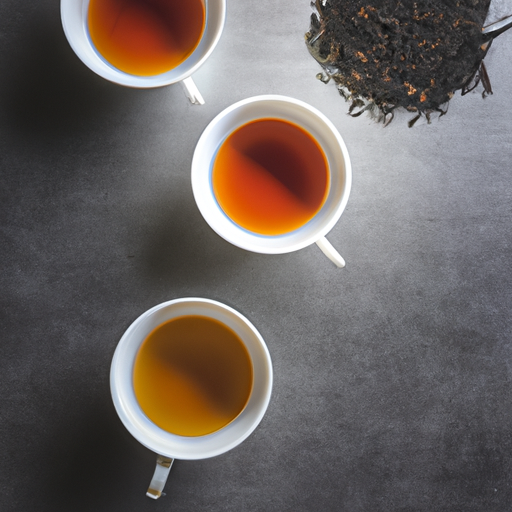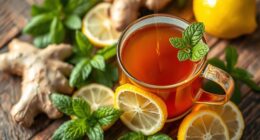Do you enjoy sweet tea like I do? There’s nothing quite like a glass of that southern nectar, sweet and refreshing, with just the right amount of sweetness. But what if you’re searching for a healthier option, something that still pleases your sweet tooth without the extra sugar?
Well, my friend, I have some good news for you. The world of herbal tea is bursting with options that are just as sweet as sweet tea, if not sweeter. Yes, you heard me right. These herbal brews pack a punch of natural sweetness that will leave you craving for more.
From the soothing chamomile to the refreshing peppermint, and the nutty rooibos to the tangy hibiscus, there’s a sweet herbal tea out there for everyone. And if that’s not enough, we even have stevia leaf tea, a natural sweetener that will elevate your tea-drinking experience to a whole new level.
So, join me on this journey as we explore the world of herbal tea and discover the perfect sweet brew that will make your taste buds sing.
Key Takeaways
- Herbal teas offer natural sweetness without added sugar.
- Chamomile tea has a delicate aroma and honey-like taste.
- Peppermint tea is refreshing and offers health benefits.
- Rooibos tea has a naturally sweet and nutty taste.
Explore the World of Herbal Tea
If you’re looking to expand your tea horizons, delving into the world of herbal teas will introduce you to a myriad of flavors and aromas that rival the sweetness of traditional sweet tea.
Herbal teas not only offer a delicious alternative to sugary beverages but also provide numerous health benefits. For those seeking relief from digestion issues, herbal teas such as peppermint or ginger can help soothe the stomach and promote healthy digestion.
Additionally, if you struggle with sleep, chamomile tea is a sweet and soothing option. Known for its calming properties, chamomile tea can help relax your mind and body, making it easier to drift off into a peaceful slumber.
With such a wide range of herbal teas available, you’re sure to find one that suits your taste and provides the sweetness you desire.
Chamomile Tea: A Sweet and Soothing Option
Chamomile tea is a delightful and soothing option for those seeking a sweet and calming beverage. When I drink chamomile tea, I experience the relaxing effects that help me unwind after a long day.
Not only is it naturally sweet, but it also has properties that promote a sense of calm and tranquility.
Experience the Relaxing Effects
Indulge in the serene and calming effects of herbal tea, as it effortlessly melts away stress and tension. Experience the soothing benefits of chamomile tea, known for its relaxing effects on the body and mind. This delightful beverage has been cherished for centuries for its ability to promote tranquility and improve sleep quality.
To truly appreciate the power of chamomile tea, picture yourself sitting in a cozy corner, sipping on a warm cup of this aromatic brew. Feel the tension leaving your body as you breathe in the delicate floral aroma and savor the smooth, honey-like taste.
| Aroma | Delicate |
| Taste | Honey-like |
| Effect | Relaxing |
| Color | Pale yellow |
Chamomile tea is the perfect choice when you crave a sweet and soothing experience. Soothe your senses and enjoy the natural sweetness of this remarkable herbal tea.
Enjoy the Natural Sweetness
Savor the delightful taste of chamomile as it effortlessly conjures images of a peaceful meadow, with its natural sweetness transporting you to a state of blissful relaxation. Chamomile tea is a perfect choice for those seeking a herbal tea as sweet as sweet tea.
Not only does it offer a pleasant flavor, but it also comes with a myriad of benefits. Known for its calming properties, chamomile tea helps reduce anxiety and promote better sleep. Its anti-inflammatory properties can also soothe digestive issues and relieve menstrual cramps. The best part? Chamomile tea is caffeine-free, making it an ideal choice for those looking to wind down at the end of the day.
So, explore the benefits of chamomile tea and find the perfect blend that suits your taste. Learn about its calming properties and discover a world of relaxation and tranquility.
Learn about its Calming Properties
Immerse yourself in the tranquil world of chamomile as you discover the soothing and calming properties that can ease anxiety and promote a restful night’s sleep. Chamomile tea is known for its natural sedative effects, making it the perfect bedtime beverage. The benefits of herbal tea for sleep are vast, and chamomile is a standout option.
As you explore different herbal tea flavors, you’ll find that chamomile stands out for its delicate floral notes and gentle sweetness. It’s a tea that envelops you in its warmth, comforting you as you prepare for a peaceful slumber. So, sip on a cup of chamomile tea and let its calming properties wash over you, preparing you for a restful night’s sleep.
Now, let’s transition to the subsequent section about peppermint tea: a refreshing and minty delight.
Peppermint Tea: A Refreshing and Minty Delight
Experience the invigorating and minty delight of peppermint tea, a refreshing herbal option that rivals the sweetness of traditional sweet tea. Peppermint tea is not only delicious, but it also offers numerous health benefits. It is known to aid digestion, relieve headaches, and reduce stress and anxiety. Making peppermint tea at home is simple. Just steep a handful of fresh or dried peppermint leaves in hot water for about 5 minutes, and then strain the liquid into a cup. To enhance the flavor, you can add a touch of honey or lemon. Now, let’s move on to the next topic: rooibos tea, a naturally sweet and nutty brew.
Rooibos Tea: A Naturally Sweet and Nutty Brew
Rooibos tea is a delightful beverage that offers a smooth and sweet taste, making it a perfect choice for those who prefer a naturally sweet brew.
Not only does it satisfy the taste buds, but it also boasts antioxidant power, which can help protect the body against free radicals and oxidative stress.
Additionally, exploring the potential health benefits of rooibos tea is a fascinating journey, as it has been associated with improved digestion, reduced inflammation, and enhanced heart health.
Enjoy the Smooth and Sweet Taste
Savor the delightful and sugary flavor of herbal tea, as sweet as a summer breeze. When it comes to smooth and sweet tea alternatives, herbal tea is the perfect choice. Not only does it offer a refreshing taste, but it also carries numerous benefits for your health. Herbal tea is known for its soothing properties, making it a great option to unwind after a long day. It can also provide relief for digestive issues and boost your immune system.
To further explore the world of herbal tea, let’s take a look at this table:
| Herbal Tea Flavor | Description |
|---|---|
| Chamomile | Mild and floral |
| Peppermint | Cool and refreshing |
| Hibiscus | Fruity and tangy |
| Lemon Balm | Citrusy and calming |
| Lavender | Fragrant and relaxing |
Now that you know the smooth and sweet taste herbal tea offers, let’s delve into its antioxidant power in the next section.
Learn about its Antioxidant Power
Delving into the realm of herbal infusions, one can uncover the remarkable antioxidant prowess that these delightful blends possess. Antioxidant research has shown that herbal teas, with their natural plant compounds, offer a powerful defense against harmful free radicals in the body.
From chamomile to hibiscus, there is a wide array of herbal tea varieties to choose from, each offering its own unique profile of antioxidants. Chamomile, for example, contains flavonoids that’ve been linked to reduced inflammation and improved heart health. On the other hand, hibiscus tea is known for its high levels of anthocyanins, which’ve been associated with lower blood pressure.
These herbal teas not only provide a sweet and refreshing taste but also hold the potential for various health benefits. Discovering their potential is a journey worth embarking on.
Discover its Potential Health Benefits
Uncovering the potential health benefits of these enticing blends is a fascinating journey filled with discoveries waiting to be made.
Herbal teas, besides being delicious and refreshing, offer a wide range of potential health benefits. They’re known to contain antioxidants, which help protect the body against harmful free radicals and reduce the risk of chronic diseases.
Some herbal teas, like chamomile and peppermint, have calming properties that can aid in relaxation and improve sleep quality. Others, such as ginger and turmeric, have anti-inflammatory properties that may help reduce pain and inflammation.
While herbal teas generally have a good safety profile, it’s important to note that some individuals may experience potential risks or interactions. It’s always recommended to consult with a healthcare professional for dosage recommendations and to ensure herbal teas are suitable for your specific health needs.
Now, let’s move on to hibiscus tea: a tangy and floral treat.
Hibiscus Tea: A Tangy and Floral Treat
You’ll adore the tangy and floral taste of hibiscus tea as it blooms in your cup and envelops your senses with its vibrant hues and aromatic fragrance.
The tartness of hibiscus adds a delightful zing to each sip, awakening your taste buds and leaving a refreshing sensation on your palate.
Not only does hibiscus tea offer a unique flavor experience, but it also comes with a range of health benefits. Rich in antioxidants, this vibrant tea helps support a healthy immune system and may assist in maintaining normal blood pressure levels. Additionally, hibiscus tea is known to possess potential anti-inflammatory properties and could aid in digestion.
Transitioning into the subsequent section about stevia leaf tea, we explore another exciting option for those seeking a natural sweetener.
Stevia Leaf Tea: A Natural Sweetener
Looking for a healthier alternative to sugar? Try stevia leaf tea, it’s a natural sweetener that can satisfy your cravings without the guilt. Stevia is a plant native to South America, and its leaves have been used for centuries as a natural sweetener. The great thing about stevia leaf tea is that it contains zero calories, making it a perfect choice for those watching their weight or trying to cut back on sugar. Not only does stevia leaf tea provide a natural alternative to sugar, but it also has some health benefits. It has been found to help regulate blood sugar levels and may even have anti-inflammatory properties. So why not give stevia leaf tea a try and enjoy its sweet taste while reaping the health benefits as well? In the next section, we will explore the art of blending herbal teas to create your perfect sweet brew.
Blending Herbal Teas: Creating Your Perfect Sweet Brew
Start by experimenting with different combinations of herbs to create a personalized blend that perfectly suits your taste buds. Blending techniques are key when it comes to crafting a sweet herbal tea that rivals the sweetness of traditional sweet tea.
Here are some flavor pairings to consider:
-
Chamomile and lavender: This combination offers a delicate and soothing sweetness.
-
Mint and lemon verbena: The refreshing mint complements the citrusy notes of lemon verbena for a zesty and sweet blend.
-
Hibiscus and rose petals: The tartness of hibiscus combines beautifully with the floral sweetness of rose petals.
-
Ginger and lemongrass: The warmth of ginger pairs harmoniously with the bright citrus flavors of lemongrass for a subtly sweet and spicy infusion.
-
Vanilla and cinnamon: These classic flavors create a rich and indulgent tea with a natural sweetness.
By experimenting with different herbs and flavor combinations, you can create a unique and sweet herbal tea that satisfies your cravings.
Frequently Asked Questions
Can herbal tea be as sweet as sweet tea?
Herbal teas can indeed be naturally sweet and just as satisfying as sweet tea. I once had a blend of chamomile and hibiscus that tasted like a delicate dessert, leaving me refreshed and content.
What are some herbal teas that have a naturally sweet flavor?
Some herbal teas, like chamomile and rooibos, have a naturally sweet flavor without added sugars. Choosing herbal tea over sweet tea can offer benefits like antioxidants and lower calorie intake.
Can herbal teas be used as a substitute for sweet tea in recipes?
Sure, herbal teas can be a great substitute for sweet tea in recipes. Not only do they offer a range of health benefits, but alternative sweeteners like honey or stevia can add a touch of sweetness.
Is it possible to enhance the sweetness of herbal tea without adding sugar?
There are several ways to naturally sweeten herbal tea without adding sugar. Steeping the tea for a longer duration, adding a splash of fruit juice, or using herbal tea blends specifically made for those with a sweet tooth can enhance the sweetness.
Are there any herbal teas that can help reduce sugar cravings?
Herbal teas like peppermint, chamomile, and licorice root can help reduce sugar cravings. They offer a natural sweetness and provide numerous benefits, such as improving digestion and promoting relaxation.
Conclusion
In conclusion, exploring the world of herbal tea has been a delightful journey. From the sweet and soothing chamomile tea to the refreshing and minty peppermint tea, there is a wide range of options to satisfy any sweet tooth.
One interesting statistic to note is that herbal tea is becoming increasingly popular, with sales increasing by 8% each year. So why not indulge in the natural and flavorful sweetness of herbal tea? It’s a refined and health-conscious choice for all tea enthusiasts.

